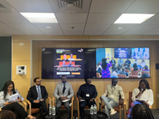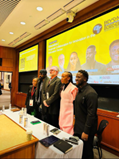At a time when Africa’s youth population is booming and its digital economy is rapidly evolving, one entrepreneur is making the case that the future of the continent lies not in aid, but in agency.
Speaking at the Africana Conference, under the theme “Changing the Lens: Redefining African Agency, at the Fletcher School at Tufts University, Jeph Acheampong, Founder of Blossom Academy, joined a panel of entrepreneurs and leaders to discuss the theme of African agency and how it’s reshaping the continent’s economic and technological trajectory.
“We don’t measure success by how many students graduate. We measure it by how many secure sustainable careers. That’s why we’ve maintained an 85 percent career placement rate—because real impact means economic inclusion,” he said.
Acheampong’s remarks centered on Blossom Academy’s mission to equip young Africans with market-relevant digital skills—and more importantly, connect those skills to real, paid work. The academy partners with companies actively hiring, often facilitating internships that lead to full-time employment.
In a conversation that spanned over an hour, panelists explored how African agency demands more than just training—it requires transforming systems.
Acheampong emphasised the need to reframe Africa’s youth dividend: “Every year, 12 million young Africans enter the workforce, but only three million find jobs. We keep talking about the skills gap. But the real issue is the jobs gap. Are we creating enough opportunities? That’s what African agency must tackle.”

“One solution? Building a digitally fluent workforce to manage and scale emerging technologies such as AI across the continent. Africa doesn’t just need coders. It needs AI product managers, digital designers, and system thinkers,” Acheampong added.
Fellow panelist Johnson Arkaah, Regional Lead at Global Vodafone Business Technology & Solutions – America and International, echoed the sentiment.
“If you want to lead, you have to create leaders,” Arkaah said.
The panel reached consensus that African agency is not a philosophical ideal—it’s an urgent and actionable framework for empowering the continent’s next generation.
Acheampong closed his remarks with a call to African entrepreneurs navigating partnerships with governments, industry, and philanthropy: “Be bold about your vision, but flexible in execution. Anchor every decision in purpose. If a funder asks you to chase vanity metrics, walk away”.
He also called for bold policy interventions to align education with employment, urging African governments to incentivise private sector participation through paid internships and youth hiring programmes.
“We need policies that bridge learning with earning. Tax incentives—like reduced corporate income tax and VAT exemptions in the early years—can make Ghana more attractive to global firms seeking affordable, high-quality talent,” he emphasised.
He pointed to India’s IT boom, fueled by special economic zones and tax breaks, as a model.
“Ghana’s free zones already exist, but there’s untapped potential to expand them into digital outsourcing hubs with targeted incentives. That’s how we compete globally,” he added.
Acheampong argued that such policies could unlock a new wave of digital job creation—turning Africa’s youth bulge into a competitive edge.
For Blossom Academy, African agency means more than empowerment—it means ownership, authorship, and long-term sustainability. As the conversation at Fletcher School made clear, the future of Africa will be written by those who dare to invest in its potential—and build the systems to sustain it.










